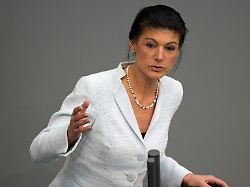35 parties admitted
BSW and Last Generation are allowed to run in the European elections
March 29, 2024, 9:39 p.m
Listen to article
This audio version was artificially generated. More info | Send feedback
A lot to do for the Federal Returning Officer. 59 groups and parties want to run in the European elections at federal and state level. 35 of them are allowed to do this, including the Last Generation and the Sahra Wagenknecht Alliance. A party with roots in Turkey is controversial and also involved.
35 parties and other groups have been approved for the European elections in June in Germany. The authority of the Federal Returning Officer announced this. In addition to the newly founded Alliance Sahra Wagenknecht (BSW) and many smaller associations, the Democratic Alliance for Diversity and Awakening (Dava) is also allowed to compete. It has been widely criticized in recent weeks as an offshoot of President Recep Tayyip Erdogan’s AKP, the Turkish ruling party. The Dava rejects this.
The climate activists of the last generation and smaller groups with special interests were also admitted, for example the Party of Reason, the Human World – for the Well-Being and Happiness of All or the Party for Conventional Medical Rejuvenation Research.
Parties and groups such as the “Planetary Democrats” and “Future Mega” were rejected. The Federal Election Committee, headed by Federal Returning Officer Ruth Brand, discussed a total of 59 applications in a public meeting – 40 for participation at the federal level and 19 applications for individual federal states. Of the latter, however, 16 applications went to the CSU in Bavaria and the CDU in the remaining 15 federal states.
Less than one percent was enough for a seat in parliament
Unlike the federal election, there is no threshold in the European elections in Germany – a minimum threshold that must be overcome in order to be represented in the EU Parliament. Mathematically, less than one percent of the vote is enough to send a representative. Anyone who is not represented in the European Parliament, the Bundestag or a state parliament must be able to show a certain number of signatures of supporters and submit a statute and a political program.
In 2019, in addition to the parties represented in the Bundestag, seven other parties also received at least one mandate: the Pirates, the Animal Welfare Party, the Family Party, the ÖDP, the satirical party The Party, Volt and the Free Voters, which were the only ones in this group to receive two mandates . All of these parties have now been re-admitted.
The people of Germany can elect 96 MEPs on June 9th. Because the voting age has been lowered, 16 and 17 year olds can vote for the first time.
